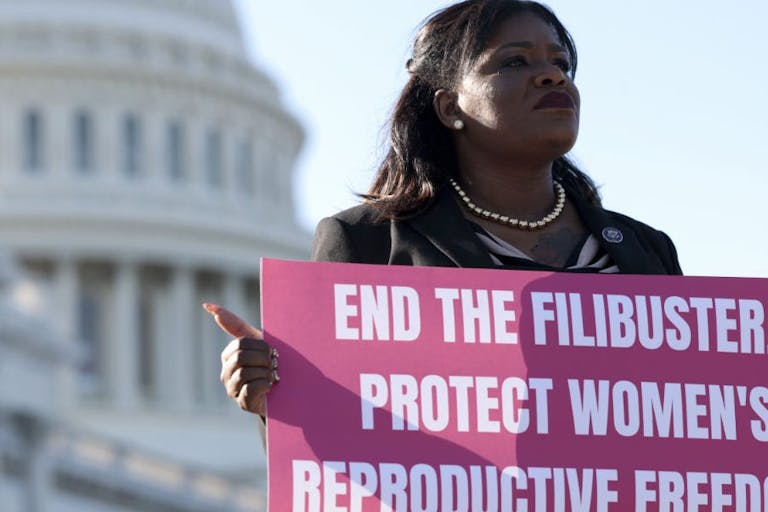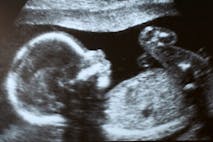Whoa. @CoriBush says she changed her mind about getting an abortion when she was 19 but the abortionist ignored her pleas, put the instrument inside her, and “started the instrument” to kill her baby. “I’m saying no.” “They absolutely ignored me.”

Rep. Cori Bush reveals she was forced into a second abortion at 19: ‘They ignored me’
Rep. Cori Bush reveals she was forced into a second abortion at 19: ‘They ignored me’
Congresswoman Cori Bush (D-Mo.) has revealed that she underwent a second abortion at age 19. During the procedure, she says she had a change of heart, but when she asked to get up from the table, the nurse and abortionist refused and forced her to undergo the abortion against her will.
In a “PBS Firing Line with Margaret Hoover” interview, Bush spoke about her book in which she discusses her abortions. She spoke to Hoover about her second abortion. “I was thinking back to the first abortion, ‘Okay, you’ve done this before. You know the rooms. You know what it looks like. You know what it feels like in this place. You know what to expect. You know that you may experience even some harm or some racism in this space,'” she said. “Like, I thought I was ready.”
Despite believing that she “was ready” for her second abortion, Bush has said her first abortion, following a rape, was “the beginning of a very, very dark period… that was the darkest period of my life.” At the facility for that first abortion, she says she was told that she would “wind up on food stamps and welfare” if she kept her baby. She said the abortion counselor was “almost angry” and spoke to her in “belittling and degrading” ways. She also said she wasn’t given the chance to make a decision but was pushed toward abortion while hoping for one voice to tell her she could keep her baby. But she never heard that voice.
For these reasons, she knew that with her second abortion, she would likely face the same “racism” she alluded to facing during the first abortion. She said she went through the “assembly line” of rooms but when she got to the last room in which the actual abortion would take place, she had second thoughts. Again, she needed a voice — a person — to help her.
She explained (emphasis added):
And I lay there and I started to think. Well, one, I didn’t tell the father that that was about to happen. And I just, I just felt like I needed more time. So I said, ‘No, you know what, I’m not ready.’ And the nurse, just, ya know, wouldn’t listen to me. And I said, ‘No, I’m not ready.’ And as I’m saying, ‘No,’ they continue to pull the instruments and, you know, get everything ready and it was just like, ‘No, calm down,’ you know, ‘No, you’re gonna be okay.’ […] They absolutely ignored me even to the point of ‘Calm down’ as if I was the problem. […] And so I remember laying there looking to see if there was someone else in the room that would listen to me. And they ended up putting, during this time, they put the instrument inside me and started the instrument […] and I’m saying, ‘No,’ but it was too late because you couldn’t stop once it started.
That instrument was likely the catheter used in a first-trimester D&C abortion, which uses high suction power to remove the baby from the uterus in pieces. The abortionist then uses tools to scrape the lining of the uterus to remove any remaining parts.

Article continues below
Dear Reader,
In 2026, Live Action is heading straight where the battle is fiercest: college campuses.
We have a bold initiative to establish 100 Live Action campus chapters within the next year, and your partnership will make it a success!
Your support today will help train and equip young leaders, bring Live Action’s educational content into academic environments, host on-campus events and debates, and empower students to challenge the pro-abortion status quo with truth and compassion.
Invest in pro-life grassroots outreach and cultural formation with your DOUBLED year-end gift!
Bush told Hoover that she thinks the nurse and abortionist ignored her because she was a young, Black woman and most medical professionals didn’t listen to her for that same reason. “Multiple times, I felt it was, ‘Oh well, we know better. You don’t know what you need. You don’t understand. We know better.'”
Bush isn’t alone. Women’s medical concerns are often ignored by medical professionals, and this is even more common for Black women. And in the abortion industry, coerced and forced abortions are tragically common practices. Women and girls have been told they have to meet certain criteria in order to be worthy enough to give birth to and raise their babies. Women are told they must be a certain age, with a certain financial status and a certain educational status — otherwise, abortion is their only option. When girls and women change their minds on the table, there have been times when the staff take advantage of their vulnerability and won’t let them leave.
A woman named Marion recalled that she told the nurse at the abortion facility at age 17, “I don’t want to do this. My mother is forcing me to do this. Can you help me?” The nurse replied, “There are other people waiting. Do you want to have this procedure done or not?” With no one left to turn to, she underwent the abortion.
Likewise, Cheryle said as she cried laying on the abortion table, she told the staff that she had changed her mind. “I didn’t want to do this. I wanted to keep my baby. The ‘doctor’ instructed the nurse to strap me down. She tightened the straps that held my legs and one on my arm and before I knew what was happening, they had administered anesthesia. It was over.”
Americans United for Life president Catherine Glenn Foster revealed to CBN News that four abortion staffers held her down during an abortion against her will. “I asked to get up. I said ‘please let me up. Let me off this table, out of this room. I don’t want this anymore.’” she told CBN. “I said, ‘… Just let me go. You can keep the money.’ And they shouted for more people and I had four people holding me down. One – a nurse – and a staff member on each arm. The doctor aborted my child. I’m screaming….”
A 2022 undercover investigation by Live Action revealed that late-term abortionist Cesare Santangelo, owner and operator of Washington Surgi-Clinic abortion facility in Washington, D.C., doesn’t even let women speak to him until they have taken Xanax and are “pants down” in the stirrups on the table. This compromises their ability to give truly informed consent.
Racism, as Bush points out, is also commonly known to exist in the abortion industry. Nationally, Black women have the highest abortion percentage, rate, and ratio. The intentions of Planned Parenthood’s founder Margaret Sanger were never to help Black women, but to prevent them from having babies. In those first days of Sanger’s birth control push, the Black community was suspicious of her intentions and accused Planned Parenthood of “Black genocide.” Even as the abortion corporation attempts to disassociate from its racist founder, it still targets Black communities and deals with inside accusations of present-day racism as well.
Bush’s story is similar to the stories of countless American women who have experienced abortion. They don’t make the choice out of empowerment but out of fear, pressure, coercion, and even physical force. Bush’s story, like so many others, reveals that the abortion industry does not necessarily care about women or their so-called “choice” and bodily autonomy. The abortion industry is profitable, and has a history of putting profits before women’s safety.
Sadly, Bush is pro-abortion despite her experiences and it is because of this that she has inadvertently helped to push more women into abortions they don’t want. Instead of touting abortion as necessary and justifying her own abortions, perhaps one day Bush will seek healing for the trauma she endured from her abortions and begin to help other women avoid the same fate.

Live Action News is pro-life news and commentary from a pro-life perspective.
Contact editor@liveaction.org for questions, corrections, or if you are seeking permission to reprint any Live Action News content.
Guest Articles: To submit a guest article to Live Action News, email editor@liveaction.org with an attached Word document of 800-1000 words. Please also attach any photos relevant to your submission if applicable. If your submission is accepted for publication, you will be notified within three weeks. Guest articles are not compensated (see our Open License Agreement). Thank you for your interest in Live Action News!
Read Next

Welsh women denied needed pregnancy medication are getting abortions
Cassy Cooke
·More In Analysis

Analysis
Welsh women denied needed pregnancy medication are getting abortions
Cassy Cooke
·
Analysis
Disability rights groups file lawsuit to stop Delaware assisted suicide law
Angeline Tan
·
Analysis
Woman intentionally hit pro-life activist with her SUV at Planned Parenthood
Cassy Cooke
·
Politics
Arizona pro-life agenda undeterred by pushback and an ongoing lawsuit
Madison Evans
·
Opinion
Can IVF ever be ethical? Here are some things to consider.
Nancy Flanders
·More From Nancy Flanders

Issues
Annual report shows increase in Canada's assisted deaths
Nancy Flanders
·
Human Interest
Pro-life nuns send annual Christmas cards to abortion businesses across the US
Nancy Flanders
·
Investigative
Worker finds deceased 27-week baby inside San Diego porta-potty
Nancy Flanders
·
Pop Culture
Pro-abortion critics slam Gwen Stefani for partnering with Catholic Hallow app
Nancy Flanders
·
Human Interest
Twin born at 23 weeks fought to survive after brother's death
Nancy Flanders
·